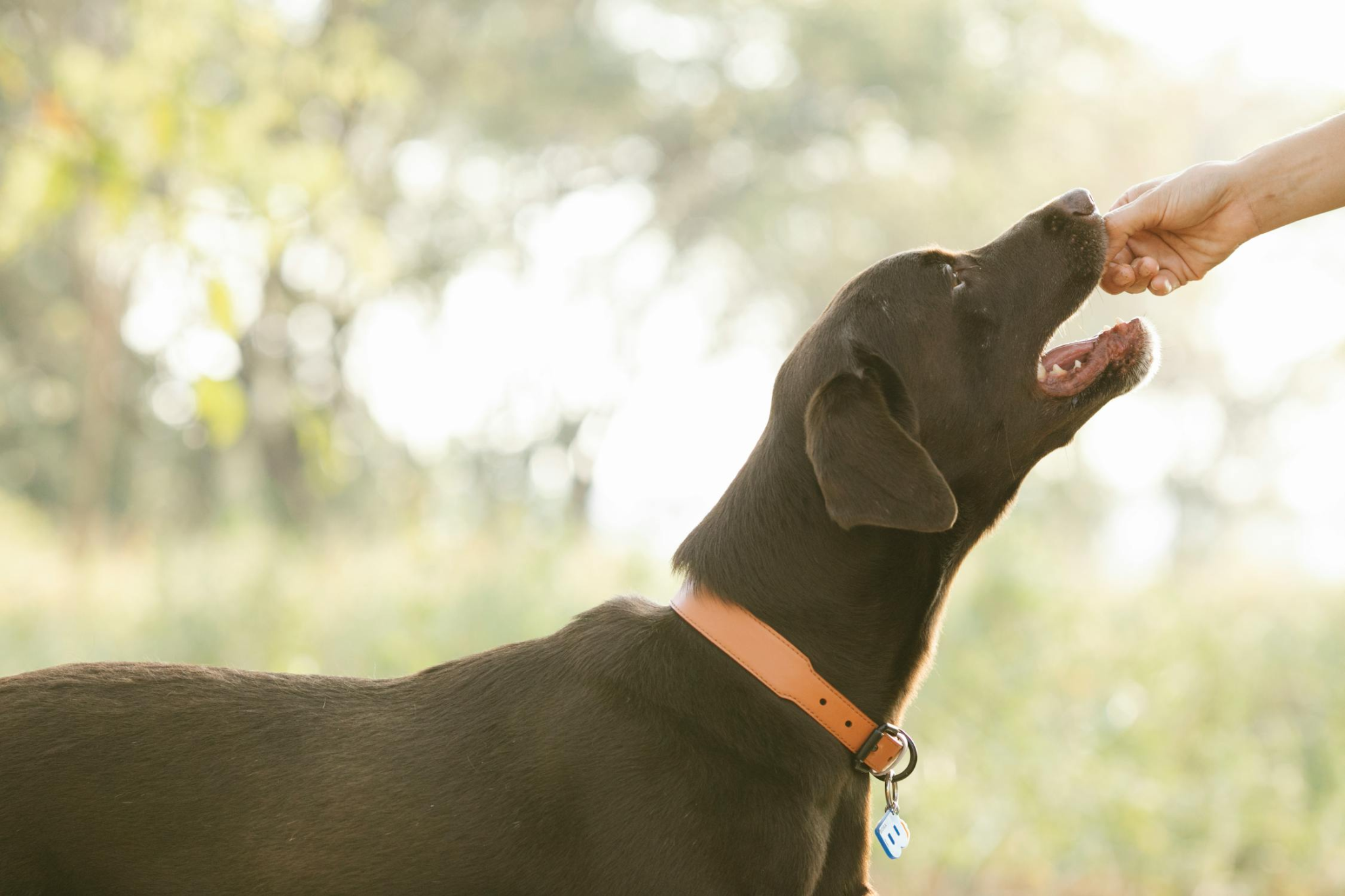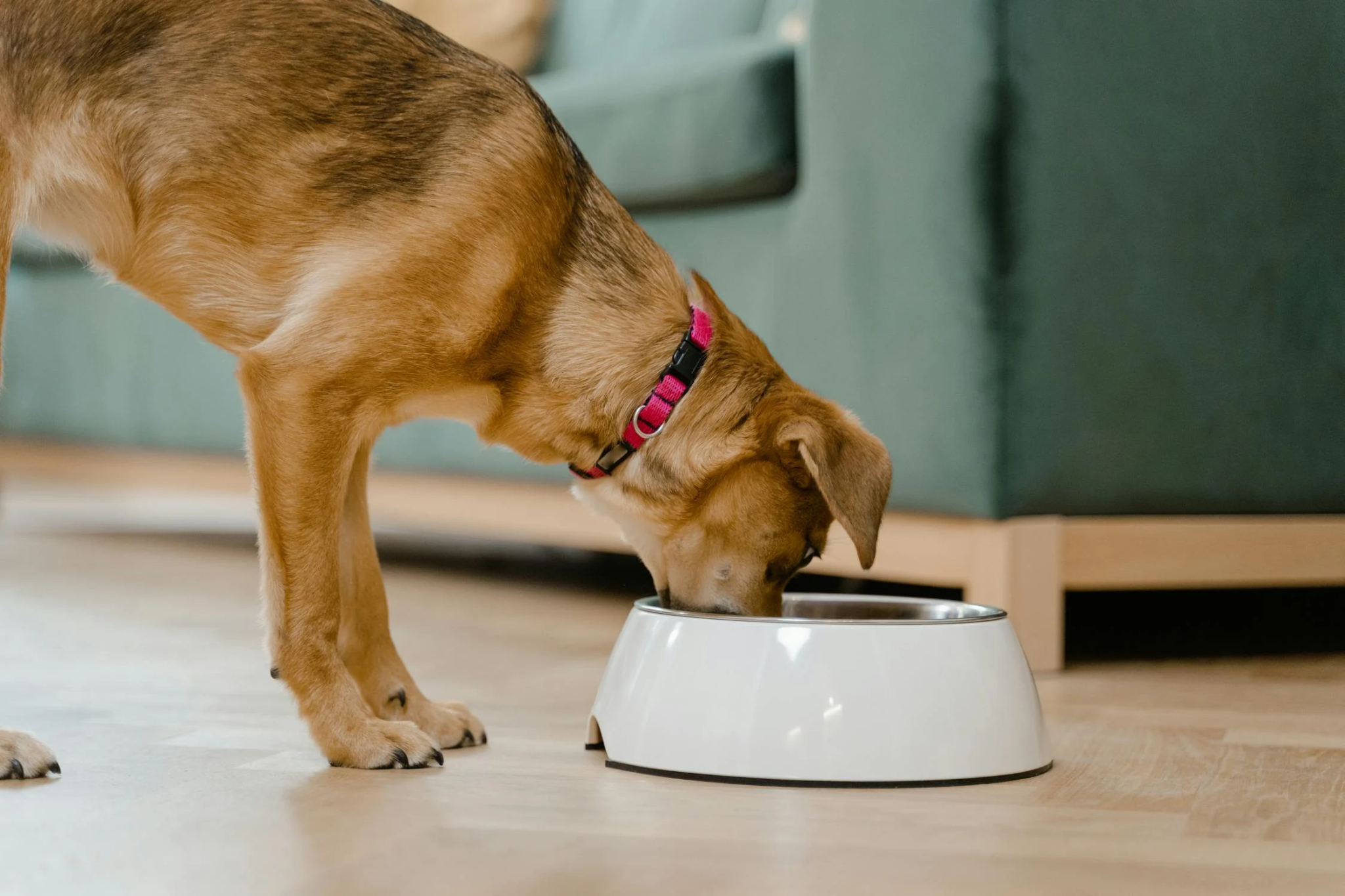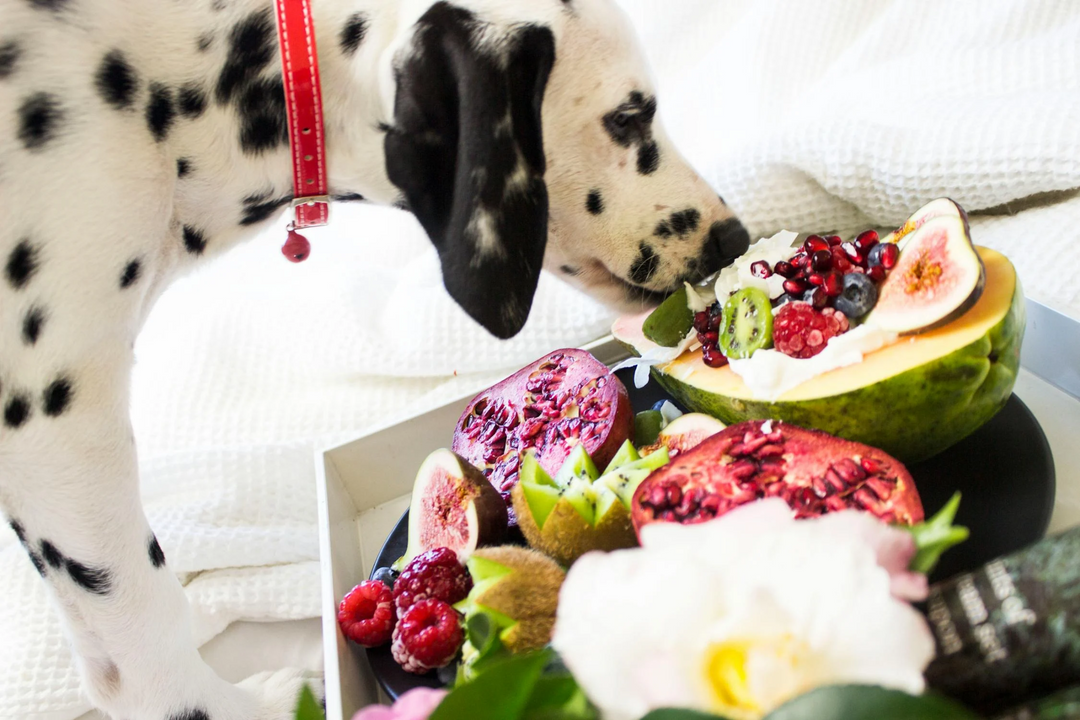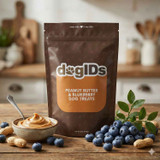Can My Dog Eat This? A List of Human Foods Dogs Can and Can't Eat
As loving dog owners, we consider our furry companions members of the family. They share our homes, walks, and desire for a tasty snack. It's incredibly tempting to share a bite of whatever we're eating, especially when met with those irresistible puppy dog eyes.
However, a treat for you can sometimes be a serious health risk for your dog. Their digestive systems and metabolic processes are different from ours, and specific compounds found in human foods can be complex for them to process, leading to anything from mild stomach upset to severe toxicity and even death.
At dogIDs, we're dedicated to helping you keep your dog safe and healthy. While we often focus on providing durable, personalized gear like our custom dog tags and strong dog collars for security and identification, we know that what goes into your dog's body is just as important as ensuring it finds its way home if it wanders.
We've created this comprehensive guide to help you navigate the complexities of canine nutrition and human foods. We'll explore many common foods you might be tempted to share and give you clear answers on whether they are safe, why, and how to offer them responsibly if they are.
Crucial Veterinary Disclaimer: This guide provides general information and should not replace professional veterinary advice. Every dog has unique health needs, sensitivities, and potential allergies. Always consult your veterinarian before introducing any new food into your dog's diet, especially if your dog has pre-existing health conditions, digestive issues, or known allergies. If your dog has ingested something potentially harmful, contact your vet or a pet poison control center immediately.
Let's uncover which human foods are safe to share in moderation and which must be kept strictly out of paw's reach.
General Guidelines: Sharing Food Safely
Before we dive into specific foods, here are some overarching principles for sharing any human food with your dog:
- Moderation is Paramount: Human food treats should never constitute more than 10% of your dog's daily caloric intake. Their primary nutrition should come from a high-quality, balanced dog food formulated for their life stage and size.
- Keep it Plain: Always feed human food, cooked and plain. Avoid added salt, sugar, spices, butter, oils, sauces, gravies, or seasonings, as these are often unhealthy or toxic for dogs.
- Remove Hazards: Seeds, pits, cores, rinds, and bones must always be removed before offering food to your dog. These can cause choking, intestinal blockages, or contain toxic substances.
- Cut into Safe Sizes: To prevent choking, chop food into small, manageable pieces appropriate for your dog's size and breed.
- Introduce Gradually: Introduce any new food in very small amounts to see how your dog's digestive system reacts. Watch for signs of upset stomach, gas, vomiting, or diarrhea.
- Never Share From Your Plate: This can encourage begging and establish bad habits. Give treats separately in their bowl or by hand, away from the table.
Foods Generally Safe for Dogs (in Moderation & Prepared Properly)
Here's a quick overview of foods often considered safe when the above guidelines are followed. We'll cover many of these in detail below.
- Fruits: Apple (no core/seeds), Banana, Blueberries, Cantaloupe (no rind/seeds), Cranberries, Mango (no pit/skin), Orange (small amount, no peel/seeds), Pear (no core/seeds), Pineapple (no skin/core), Pumpkin (plain, cooked), Raspberry (very small amount), Strawberry, Watermelon (no rind/seeds).
- Vegetables: Asparagus (plain, cooked), Broccoli (small amount, plain, cooked), Carrot, Celery (cut small), Cucumber, Green Beans, Lettuce, Peas, Potato (plain, cooked), Sweet Potato (plain, cooked), Zucchini.
- Proteins & Grains: Cooked Chicken (plain), Cooked Beef (plain), Cooked Turkey (plain), Cooked Fish (plain, boneless), Plain Cooked Rice, Plain Cooked Pasta, Cooked Eggs (plain).
- Other: Peanut Butter (xylitol-free), Cheese (very small amount, low-fat), Honey (very small amount), Plain Yogurt (unsweetened), Plain Popcorn (air-popped, no salt/butter, no kernels).
Foods That Are Dangerous or Toxic to Dogs
This list includes foods that should never be given to dogs due to the risk of toxicity, severe illness, or death.
- Toxic: Grapes & Raisins, Chocolate (especially dark & baking chocolate), Xylitol (found in sugar-free products), Onions, Garlic, Leeks, Chives (allium family), Macadamia Nuts, Alcohol, Coffee & Caffeine, Moldy Food, Yeast Dough.
- Hazardous/Unhealthy: Avocados (Persin + Pit hazard), Cherry pits/stems/leaves (Cyanide + Pit hazard), Apple cores/seeds (Cyanide + Choking/Obstruction), Peach pits (Cyanide + Obstruction), Almonds & other nuts (digestion issues, high fat, choking, potential toxins), Cooked Bones (splinter risk), High-fat foods (pancreatitis), Excessive Salt (sodium poisoning), Excessive Sugar (obesity, dental issues), Nutmeg (toxic in large amounts), Rhubarb.
Your Specific Questions Answered: A Detailed Food-by-Food Guide

Let's get into the specifics for some of the most common human foods dog owners ask about, providing clear answers and essential details for each.
Can Dogs Eat Oranges?
Many pet owners wonder, Can dogs eat oranges? The answer is yes, but with important caveats and strict moderation. The flesh of oranges is not toxic and contains beneficial Vitamin C, fiber, and potassium. However, oranges are also high in natural sugars and are quite acidic, which can cause digestive upset or weight gain if given in large amounts. It is essential to remove the tough peel, which is hard to digest and can cause blockages, and all seeds, which are a choking hazard and contain trace amounts of cyanide. Offer only small, plain, seedless segments as a rare treat.
Can Dogs Have Cinnamon?
When people ask, Can dogs have cinnamon, the simple answer is yes, in very small quantities, plain cinnamon is generally safe. It is not considered toxic to dogs. Some studies suggest potential benefits, like anti-inflammatory properties. However, giving large amounts of cinnamon powder can irritate a dog's mouth and digestive tract, potentially causing coughing, choking, or stomach upset. The primary concern is often the food that contains cinnamon, like baked goods, which are usually full of sugar, fat, and sometimes harmful ingredients like xylitol or nutmeg. Stick to a tiny sprinkle of plain cinnamon on dog-approved food, if any.
Can Dogs Have Pineapple?
Yes, in moderation, dogs can have pineapple. This sweet, tropical fruit can be a refreshing and tasty treat for your canine companion. Pineapple is a good source of vitamins (especially Vitamin C and B vitamins), minerals, and fiber. It also contains bromelain, an enzyme that might aid digestion. However, pineapple is relatively high in natural sugars, so feeding too much can lead to weight gain or digestive upset. Crucially, you must remove the tough, spiky skin and the fibrous core before offering any pineapple. Cut the plain, fleshy part into small, appropriate-sized pieces to avoid choking.
Can Dogs Have Watermelon?
Yes, dogs can have watermelon. This is an excellent and safe dog treat, especially during warm weather. Watermelon is over 90% water, making it incredibly hydrating and a wonderful low-calorie snack. It also provides vitamins A, B6, and C and potassium. Removing all the hard, green rind and seeds is vital to feed watermelon safely. The rind is difficult for dogs to digest and can cause intestinal blockages. While a few seeds might pass, ingesting several can also lead to digestive upset or blockage. Only offer the plain, red, seedless flesh, cut into small cubes.
Can Dogs Eat Avocado?
No, you should not feed your dog avocado. The question, "Can dogs eat avocado?" is frequently asked, but this fruit contains Persin, a toxin that can cause vomiting and diarrhea in dogs, although dogs are less sensitive than some other animals. The most significant danger, however, is the large, hard pit. It is a serious choking hazard and can cause a life-threatening obstruction in a dog's digestive tract if swallowed. Avocados are also high in fat, which can trigger pancreatitis in some dogs. It's best to keep all parts of the avocado away from your canine companion to be safe.
Can Dogs Eat Broccoli?
Yes, dogs can eat broccoli, but only in very small amounts and prepared properly. Broccoli is a nutritious vegetable containing vitamins and fiber. When cooked plain, it can be a healthy, low-calorie snack option. However, broccoli contains isothiocyanates, compounds that can cause mild to potentially severe gastrointestinal irritation, gas, and upset in dogs if consumed in large quantities, particularly the florets. Always serve broccoli cooked thoroughly until soft, plain (no seasonings, oil, or butter), and cut into very small, bite-sized pieces to minimize digestive issues and choking risk. Offer it only as an occasional, tiny treat.
Can Dogs Eat Cucumbers?
Yes, dogs can eat cucumbers. This is an excellent, safe, healthy, low-calorie dog snack, making it a great option for weight management or a refreshing treat. Cucumbers are mostly water, which helps with hydration, and contain small amounts of vitamins K, C, and some B vitamins. They are perfectly safe to feed raw after washing thoroughly. Cut the cucumber into small, appropriate-sized slices or cubes for your dog to prevent any choking hazard. The flesh and the skin are safe to eat and provide beneficial fiber. Always feed plain cucumber without any added salt, spices, or dips.
Can Dogs Eat Mango?
Yes, the flesh of a ripe mango can be safely given to dogs in moderation. Many people ask, "Can dogs eat mango?" The sweet, tropical fruit is safe, provided it is prepared correctly. Mango is rich in vitamins A, B6, C, and E and fiber. However, like many fruits, it's high in natural sugars, meaning it should only be an occasional treat to avoid weight gain and digestive upset. The most significant danger is the large, hard pit, which contains trace amounts of cyanide and, more importantly, is a serious choking hazard and can cause a dangerous intestinal obstruction if swallowed. Always remove the pit and the tough skin before cutting the flesh into small, safe pieces.
Can Dogs Eat Shrimp?
Yes, dogs can eat shrimp, but it must be fully cooked, plain, peeled, and deveined. Shrimp is a good source of lean protein, B vitamins, and phosphorus, and it's relatively low in calories compared to some other meats. However, like any shellfish, dogs may have a slight possibility of allergic reactions. Always introduce it slowly with a tiny piece first. Never feed raw shrimp due to the risk of harmful bacteria. Avoid feeding shrimp fried or cooked with butter, oil, salt, garlic, onion, or other spices, as these additions are unhealthy or toxic. Offer only small amounts of plain, cooked shrimp as a rare treat.
Can Dogs Eat Carrots?
Yes, dogs can eat carrots. Carrots are widely recommended as one of the safest and healthiest snacks you can share with your dog. They are an excellent source of beta-carotene (which converts to Vitamin A), fiber, and antioxidants. Chewing on raw carrots can also be great for your dog's dental hygiene, helping to scrape away plaque and promote healthy gums. You can feed carrots raw or cooked (plain). Raw offers a satisfying crunch and dental benefits, while cooked is softer and easier for older dogs or puppies to eat. Cut them into appropriate bite-sized pieces to prevent choking.
Can Dogs Eat Celery?
Yes, in moderation and prepared correctly, dogs can eat celery. Plain celery is safe for dogs and offers a low-calorie, hydrating snack option with some vitamins and fiber. It's mostly water, which is great. However, the fibrous strings and the stalk shape can pose a choking hazard, especially for smaller dogs. The fiber can also cause gas or digestive upset if large quantities are eaten. To feed celery safely, cut the stalks into small, bite-sized pieces across the width (not lengthwise). Ensure it is served plain, without dips, spreads, or seasonings containing harmful ingredients.
Can Dogs Eat Corn?
Yes, dogs can eat corn, but it must be removed from the cob and served plain. Plain, cooked corn kernels are digestible for dogs and provide some carbohydrates, vitamins, and fiber. Corn is a common ingredient in many commercial dog foods. The significant danger associated with corn is the cob itself. Dogs love to chew on cobs, but they are indigestible and can cause a severe, potentially fatal intestinal obstruction if swallowed in pieces or whole. This requires emergency surgery. Therefore, never give your dog a corn cob. Only offer small amounts of plain, cooked kernels, ensuring no part of the cob is present.
Can Dogs Eat Eggs?
Yes, dogs can eat eggs. Fully cooked eggs are a very safe and highly nutritious food for dogs. Eggs are an excellent source of easily digestible protein, essential amino acids, vitamins (including B12, A, D, and E), and minerals. They can be a valuable addition to your dog's diet or helpful as part of a bland diet for dogs with upset stomachs (like plain scrambled eggs). Always feed thoroughly cooked eggs – scrambled, boiled, or fried plain without oil, butter, salt, pepper, or other seasonings. Avoid raw eggs due to the risk of Salmonella or E. coli contamination, and potential long-term issues with biotin absorption from a protein called avidin.
Can Dogs Have Apples?
Yes, dogs can have apples. Apples are a wonderful, healthy, and safe snack for dogs. They are a good source of dietary fiber and vitamins A and C. The crunchy texture can also help clean your dog's teeth. The vital step when giving apples is to remove the core and all the seeds completely. Apple seeds contain amygdalin, which breaks into cyanide in the digestive system. While a few seeds are unlikely to cause harm, it's best to avoid them entirely. The core can also be a choking hazard. Serve plain apple slices without added sugars, caramel, or other toppings.
Can Dogs Have Tomatoes?
Generally, dogs can have tomatoes. Ripe, red tomatoes are usually considered safe for dogs in moderation. The red, fleshy part contains vitamins and fiber. However, the green parts of the tomato plant (leaves, stems, and unripe green tomatoes) contain a substance called solanine, which is toxic to dogs. Ingesting solanine can cause gastrointestinal distress (vomiting, diarrhea), lethargy, weakness, and confusion. While ripe tomatoes have much lower levels of solanine, it's best to feed only the very ripe, red fruit and ensure your dog doesn't chew on the tomato plants in your garden. If you share tomatoes, offer only small amounts of the ripe flesh.
Can Dogs Eat Almonds?
No, you should not give almonds to your dog. Almonds are difficult for dogs to digest and can cause gastrointestinal upset, vomiting, and diarrhea due to their high fat content, potentially contributing to pancreatitis. Their size and shape also pose a significant choking hazard, especially for smaller breeds, or can cause intestinal obstruction. Salted or flavored almonds are even more dangerous due to high sodium levels or other harmful additives. It's best to keep all nuts, including almonds, away from your dog.
Can Dogs Eat Cantaloupe?
Yes, dogs can eat cantaloupe. This juicy melon is safe for dogs in moderation and can be a refreshing, healthy treat. Cantaloupe is hydrating due to its high water content, and it is a good source of vitamins A and C and fiber. As with other melons, the main concern is the rind. The rind is tough, difficult to digest, and can cause stomach upset or, more seriously, intestinal blockage if swallowed. Always remove the rind completely before cutting the orange flesh into small, appropriate-sized pieces for your dog. Due to the natural sugar content, cantaloupe can be offered as an occasional special treat rather than a regular snack.
Can Dogs Eat Cheese?
Yes, dogs can eat cheese, but only in very small amounts and with caution. Many dogs love cheese, and it does contain protein and calcium. However, cheese is often high in fat and lactose. Dogs' digestive systems are not designed to process large amounts of dairy, and many dogs are lactose intolerant, leading to digestive upset, gas, vomiting, or diarrhea. High-fat cheeses can also contribute to weight gain or trigger pancreatitis in susceptible dogs. If you give your dog cheese, opt for low-fat varieties like mozzarella or cottage cheese, and offer only tiny pieces as an occasional reward, not a regular snack.
Can Dogs Eat Cherries?
No, you should not give cherries to your dog. Ingesting even a few cherry pits can release enough cyanide to cause toxicity. Beyond the chemical risk, cherry pits are hard, small, and easily swallowed, making them a significant choking hazard and a common cause of dangerous intestinal obstructions. While the fleshy part might not be immediately toxic in tiny amounts, the overall risk makes cherries a fruit best avoided entirely for dogs.
Can Dogs Eat Peanuts?
Yes, dogs can eat peanuts, but only plain, unsalted peanuts, preferably plain, unsalted, xylitol-free peanut butter. Peanuts themselves are generally safe and offer protein and healthy fats. However, they are calorie-dense due to the fat, so moderation is important to prevent weight gain and potential pancreatitis. The primary danger comes from how peanuts are processed or prepared. Salted peanuts can cause sodium poisoning. Flavored peanuts often contain harmful additives. If offering peanut butter, it is critical to check the label for xylitol, an artificial sweetener that is highly toxic to dogs and can cause rapid blood sugar drops and liver failure.
Can Dogs Eat Popcorn?
Yes, dogs can eat popcorn, but only plain, air-popped corn in moderation. The popped kernel itself is generally safe for dogs and contains some fiber. However, the additions that make popcorn delicious for us are problematic for dogs. Butter, oil, salt, artificial butter flavor, and other seasonings are unhealthy and can cause digestive upset, dehydration (from salt), or obesity. Unpopped kernels are also a risk – they are hard and can damage teeth, get stuck in gums, or cause digestive upset or blockages if swallowed. If you give your dog popcorn, ensure it is air-popped without any additions and that all unpopped kernels are removed.
Can Dogs Eat Potatoes?
Yes, dogs can eat potatoes, but they must be fully cooked and served plain. Cooked potatoes (boiled or baked) are safe for dogs and provide carbohydrates, potassium, and Vitamin C. However, raw potatoes contain solanine, a toxic compound found in nightshade plants (the family to which potatoes belong). Cooking significantly reduces solanine levels. Never feed your dog raw potato or any part of the potato plant (stems, leaves, green parts of the potato). Avoid feeding dogs cooked potatoes that have been fried (like French fries) or prepared with butter, salt, cheese, gravy, or other seasonings, as these additions are unhealthy or harmful.
Can Dogs Have Grapes?
No, you should never give grapes to your dog. Knowing that dogs cannot have grapes is critically important, a question with a definitive and absolute 'No.' Grapes and raisins are highly toxic to dogs and can cause acute kidney failure. The exact toxic substance is still unknown, which means there is no known "safe" amount – even a few grapes or raisins can be dangerous for some dogs. Symptoms of grape or raisin toxicity include vomiting, diarrhea, lethargy, dehydration, loss of appetite, and decreased urination. Kidney damage can occur rapidly. Due to the severe risk, all grapes and raisins must be kept entirely out of reach.
Can Dogs Have Honey?
Yes, dogs can have honey, but only in very small amounts and infrequently. Raw honey contains sugars, enzymes, vitamins, and minerals. Some owners give local raw h, one hoping to help with seasonal allergies (though scientific evidence for this in dogs is limited). However, honey is very high in sugar, which contributes to weight gain, dental problems, and can be particularly problematic for diabetic dogs. There's a small theoretical risk from botulism spores in raw honey for puppies or dogs with weakened immune systems. If you give honey, offer only a tiny lick as a rare treat. It should not be a regular part of their diet.
Can Dogs Eat Mushrooms?
Generally, dogs can eat mushrooms. Only plain, cooked, store-bought mushrooms from a reliable source are considered safe in small quantities. However, wild mushrooms are a strict and absolute NO. Many species of wild mushrooms are highly toxic and can cause severe illness, organ failure, or death in dogs if ingested. It is difficult to distinguish between safe and toxic wild mushrooms without expert botanical knowledge. Symptoms of mushroom poisoning vary but can include vomiting, diarrhea, weakness, tremors, seizures, and liver or kidney failure. To be completely safe, it is best to avoid giving your dog any mushrooms.
Can Dogs Eat Peaches?
Yes, dogs can eat peaches with extreme caution regarding the pit. A peach's ripe, fleshy part is safe for dogs in moderation and provides vitamins A and C, plus fiber. However, the large, hard pit is the main hazard. Like cherries and apples, peach pits contain cyanide, which is toxic (though the pit itself would need to be chewed extensively to release significant amounts). More critically, the pit is a major choking hazard and can easily cause a severe, potentially fatal intestinal obstruction if swallowed. Always slice the peach flesh away from the pit and offer your dog only small, plain pieces. Avoid canned peaches due to added sugars.
Can Dogs Eat Pistachios?
No, you should not give pistachios to your dog. While the query "can dogs eat pistachios?" comes up, and they aren't acutely toxic like macadamia nuts, they are still not recommended. Pistachios pose several risks: they are high in fat, which can cause digestive upset and potentially pancreatitis. The shells are hard, indigestible, and can cause choking or internal damage/obstruction. Furthermore, pistachios can sometimes be contaminated with Aspergillus mold, which produces highly toxic aflatoxins that can cause liver damage. Salted or flavored pistachios are even more dangerous due to high sodium and potential additives. Safer, dog-specific treats are always a better choice.
Can Dogs Have Broccoli?
Yes, dogs can have broccoli, but only in very limited amounts. As discussed earlier, plain, cooked broccoli is safe and provides nutrients like vitamins and fiber. However, the naturally occurring isothiocyanates in broccoli can cause gas, stomach upset, and irritation, especially if given in large quantities or if the dog eats a lot of the florets. Think of it as a tiny, occasional treat. Always cook it thoroughly until soft, serve it plain without seasonings, and cut it into small, bite-sized pieces to make it easier to digest and reduce choking risk. Monitor your dog for any signs of gas or digestive discomfort after they've eaten it.
Can Dogs Have Celery?
Yes, in moderation and prepared correctly, dogs can have celery. Plain celery is safe for dogs and offers a low-calorie, hydrating snack option with some vitamins and fiber. It's mostly water, which is great. However, the fibrous strings and the stalk shape can pose a choking hazard, especially for smaller dogs. The fiber can also cause gas or digestive upset if eaten in large. To feed celery safely, cut the stalks into small, bite-sized pieces across the width (not lengthwise). Ensure it is served plain, without dips, spreads, or seasonings containing harmful ingredients.
Can Dogs Have Raspberries?
Yes, dogs can have raspberries, but in very limited quantities. Raspberries are lower in sugar than many other fruits and contain antioxidants, fiber, and vitamins. They can be a safe, occasional treat. However, raspberries contain a small amount of naturally occurring xylitol. While the amount is generally considered too low to cause toxicity in most dogs if only a few berries are eaten, giving large quantities, especially to a very small dog, could be problematic. Stick to offering just a few fresh raspberries at a time as a very infrequent treat. Wash them thoroughly before giving them to your dog.
Can Dogs Eat Asparagus?
Yes, dogs can eat asparagus, but it needs to be prepared properly, and it's not the most exciting or nutrient-dense option compared to other vegetables for dogs. Asparagus itself is not toxic and contains vitamins and fiber. However, raw asparagus is tough, fibrous, and hard for dogs to chew and digest, posing a choking risk. Cooked plain asparagus (steamed or boiled without added oil, salt, or butter) is softer and safer. Even then, it can cause gas or mild digestive upset in some dogs. If you choose to offer asparagus, cook it until very soft and cut it into small, manageable pieces. Other vegetables, like carrots or green beans, offer more palatable and easily digestible benefits.
Can Dogs Eat Bread?
Yes, dogs can eat bread, but only plain, fully baked bread in moderation. Small amounts of plain white or whole wheat bread are generally not toxic to dogs and won't provide much nutritional value, but are unlikely to cause harm as an occasional tiny treat. The main risks associated with bread come from the form and added ingredients. Never give your dog raw yeast dough; it can rise in their stomach, causing dangerous bloating (gastric dilation-volvulus, GDV) and produce alcohol as it ferments, leading to alcohol poisoning. Avoid bread containing harmful ingredients like nuts (especially macadamia), seeds, garlic, onion, raisins, or xylitol. Plain, cooked bread without additives is the only safe option, and even then, sparingly.
Can Dogs Eat Green Beans?
Yes, dogs eat green beans. Absolutely! Plain green beans are an excellent and highly recommended safe snack for dogs. They are very low in calories, high in fiber, and contain beneficial vitamins like A, C, and K. Green beans are a fantastic, healthy treat option, especially for dogs who need to watch their weight, or simply as a crunchy alternative to commercial treats. You can offer fresh, frozen, or canned green beans, but ensure they are plain with no added salt, butter, oils, garlic, or onion. Lightly steamed or boiled green beans are easily digestible.
Can Dogs Eat Pickles?
No, you should not give pickles to your dog. The pickling process involves a brine typically high in salt and often includes vinegar and spices like garlic or onion (which are toxic to dogs). High sodium intake harms dogs and can lead to sodium ion poisoning. The vinegar and herbs can also irritate your dog's digestive system. Giving your dog pickles has no nutritional benefit, and the risks associated with high salt and potential harmful ingredients make them a food best avoided entirely for dogs.
Can Dogs Eat Rice?
Yes, dogs can eat rice. Plain, cooked rice is safe and often a go-to food veterinarians recommend for dogs, particularly those with an upset stomach. Plain boiled or steamed white rice is easily digestible and can help firm up stool, making it useful for managing diarrhea. Plain cooked brown rice is also safe and offers more fiber, though it may be slightly harder for some dogs to digest. Always serve rice plain, without any added salt, butter, oils, or seasonings. It is frequently mixed with plain boiled chicken or lean ground beef to create a bland, easily digestible meal for sick dogs.
Can Dogs Eat Tuna?
Yes, dogs can eat tuna, but only plain, cooked tuna in very small amounts and very infrequently. Tuna is a source of lean protein and contains omega-3 fatty acids. However, large fish like tuna (especially albacore) can accumulate higher levels of mercury over time. Regular or large consumption of tuna can lead to mercury poisoning in dogs, causing neurological symptoms. If you give tuna, opt for canned tuna packed in water (not oil) and ensure it is plain with no added salt or seasonings. Due to the potential mercury risk, safer fish options like plain cooked salmon (boneless) or plain sardines packed in water (unsalted) are generally preferable, and even these should be given sparingly.
Can Dogs Eat Turkey?
Yes, plain, cooked turkey is generally safe and can be a healthy source of lean protein for your dog. Many dog owners wonder, Can dogs eat turkey? The answer is yes, provided it's prepared correctly. This widely available meat is easily digestible for most canines and can be a nutritious occasional addition to their diet. Small pieces of boneless, skinless, plain cooked turkey make an excellent occasional treat or a minor supplement. However, it's vital to avoid feeding turkey skin (high in fat), bones (cooked bones splinter), and turkey prepared with seasonings, butter, salt, onions, or garlic, which are common in human dishes but harmful to dogs. Stick strictly to the plain, cooked meat.

Safety Tips for Sharing Human Foods
Beyond the list of specific foods, these practices are essential for responsible sharing:
- Understand Portion Control: Even healthy human foods contain calories. These calories add up and can contribute to weight gain and obesity, which can lead to numerous health problems in dogs. Remember the 10% rule rigorously.
- Preparation is Non-Negotiable: Always wash fruits and vegetables thoroughly. Remove all potential hazards, such as pits, seeds, cores, and tough skins. Cook all meats and eggs and serve them plain—no seasonings, oils, butter, or sauces.
- Introduce New Foods Slowly: Initially, only a tiny amount of new food is given. Wait 24-48 hours to see how your dog reacts. You can offer small amounts occasionally if there are no signs of digestive upset (vomiting, diarrhea, gas) or allergic reaction (itching, hives).
- Recognize Individual Sensitivities: Like people, some dogs have sensitive stomachs or specific allergies. Pay close attention to your dog's reaction to any new food, even those considered safe. If a food seems to disagree with them, stop giving it.
- Securely Store Dangerous Foods: Keep all toxic foods (like grapes, raisins, chocolate, anything with xylitol, onions, garlic) and hazardous items (like bones, corn cobs) out of your dog's reach. Use secure containers, high shelves, or child-proof locks if necessary.
- Avoid Feeding From the Table. This reinforces begging behavior, which can frustrate you and your guests. Give your dog meals and treats in its bowl, separate from family mealtimes. Using a durable dog bowl designated just for them reinforces that this is their food space.
- Educate Everyone in the Household: Make sure all family members, especially children, and regular visitors know which human foods are off-limits for your dog. Communication can prevent accidental poisonings.

What to Do in a Food Emergency
If, despite your best efforts, your dog accidentally ingests a food you know is toxic or dangerous, immediate action is critical.
- Do NOT Panic: Stay calm to think clearly and act quickly.
- Identify What Was Eaten: Determine the specific food, approximately how much was consumed, and when it was eaten. If possible, save the packaging.
- Contact Veterinary Professionals IMMEDIATELY:
- Call your local veterinarian, especially if it's during regular business hours.
- If your vet is unavailable (after hours or on weekends), contact a 24/7 Animal Poison Control Center. Reputable options include the ASPCA Animal Poison Control Center and the Pet Poison Helpline. There may be a fee for their consultation, but their expertise is invaluable in emergencies.
- Do NOT Induce Vomiting Unless Directed: Do not try to make your dog vomit or give them any home remedies unless specifically instructed by a veterinarian or poison control expert. Inducing vomiting inappropriately can cause more harm.
- Follow Instructions Precisely: Provide the professionals with accurate information and follow their guidance. Time is often of the essence in poisoning cases.
Having your dog wear a clearly legible ID tag with your current contact information can offer peace of mind in any emergency, ensuring your dog can be identified and returned to you quickly if they get loose. At the same time, you are distracted or dealing with a crisis.
Sharing Safely Strengthens the Bond
The desire to share our lives, including our food, with our dogs comes from a place of love. By arming yourself with knowledge about which human foods are safe and which are dangerous, you can confidently share the right kinds of treats in the right way, strengthening your bond without risking your dog's health.
Always prioritize a balanced, high-quality commercial dog food as the foundation of your dog's diet. Human foods, even safe ones, should only be occasional, plain, and moderate additions. When in doubt about a food, err on the side of caution and stick to treats specifically made for dogs.
Your commitment to researching and understanding canine nutrition demonstrates your dedication as a responsible pet parent. At dogIDs, we share that dedication and are here to provide you with quality products that contribute to your dog's overall safety and well-being. Whether it's a durable bowl for healthy eating habits or the security of a personalized ID tag, we're here for you and your furry best friend.
Feed smart, play often, and enjoy every happy, healthy moment with your dog!
Explore Popular Articles
-
How To Choose the Right Dog Collar (2026 dogIDs Pack Leader’s Guide)
Dec 10, 2025If you're new to the dog world, choosing a collar can feel like trying to order coffee in a new lang
-
Why We Ditched Seed Oils: The Story Behind Our New Dog Treats
Dec 03, 2025We all know that feeling. You’re standing in the pet aisle, holding a bag of dog treats, squinting a
-
The Ultimate Guide to Silent Dog ID Tags: How to Stop the 'Jingle' Forever
Nov 26, 2025Image generated by Google Gemini Not to make light of a serious issue like noisy dog tags in the ho





